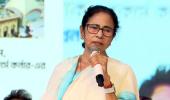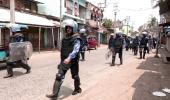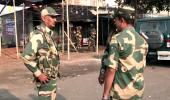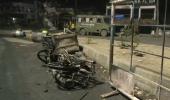'Mamata needs to address the anger and resentment among various sections of the Hindu community because low-scale communal violence has always paid richer electoral dividends for the BJP.'

At least three people were killed and hundreds were rendered homeless in communal violence in parts of Murshidabad district in West Bengal on April 11 and 12 during protests against the Waqf (Amendment) Act.
Suvendu Adhikari, leader of the Opposition in the West Bengal assembly, blamed the police and the ruling Trinamool Congress for violence and the immediate resignation of Chief Minister Mamata Banrejee, who he said failed to protect the lives and property of people from attacks by jihadi elements given a free run in the state because of the TMC's appeasement politics.
Quick to strike while the iron is hot, Uttar Pradesh Deputy Chief Minister Keshav Prasad Maurya said, 'Hindus of West Bengal, once known as the 'Bhadralok' of the country, are being crushed between the challenge of Muslim fundamentalism and Bangladeshi infiltration and on the other side by the autocratic rule of Mamata Banerjee who is anti-Hindu'.
Bengal and Bengalis once known for its secular credentials has increasingly become a hotbed of communal violence, Islamophobia and hate-mongering. But is the Muslim bogey -- Muslims will take over Bengal from the Hindu majority -- real or is it a mythical beast birthed by the BJP?
"The anxiety of the Muslim population taking over the Hindus is being programmatically fuelled by the RSS," says Maidul Islam, a political scientist and professor of political science at the Centre for Studies in Social Sciences, Kolkata.
Digging deep into history, political science and the Bengali Bhadrolok mindset, Professor Islam busts myths and separates the wheat from the chaff in an depth e-mail interview with Swarupa Dutt/Rediff.
Part one of a two-part interview:

Is the Bengali Bhadralok shedding its secular carapace? Religion, caste, and Hindutva, which were never a divisive factor in Bengal, are now part of living room conversations. Would you agree?
The Bengali Bhadrolok was always divided into conservatives and secular liberals.
It seems that the breed of old secular liberals is slowly waning, and a generational shift has also occurred among the Bengali Bhadrolok.
Thanks to the RSS-backed BJP's firm foothold in the central government, along with several BJP-led state governments throughout India, including in neighbouring Assam and Odisha, a constant propaganda machinery is in force in our everyday lives through most of the mainstream media and social media, campaigns for more conservative and ideologically right-wing articulations.
As a result, the conservative sections among the Bengali Bhadraloks are now more candid and do not shy away from publicly expressing their viewpoints on Hindutva.
This trend is not only limited to the conservative sections of the Bengali Bhadrolok in West Bengal but also among the Bengali diaspora and those Bengalis who live in other Indian states.
Caste, however, was always latent among the Bhadroloks that came to prominence during marital choices.
One can only see the matrimonial advertisements in dailies to see the importance of caste among the Bengalis.
Of late, the fear of the Muslim minority taking over Bengal is something that Bengalis with secular credentials have spoken about.
That, 'soon Bengal will be 100 per cent Muslim and Hindus will have to leave the state'.
Age-old prejudices are suddenly gaining a mainstay and growing into intolerance towards Muslims in Bengal.
What are your observations?
This sentiment over the Muslim population explosion is nothing new.
It was also expressed by the Hindu Mahasabha and later the various branches of the Sangh Parivar in the decades before and after Partition at an all-India level.
At the national level, Muslims are only 14.2% according to the 2011 Census. By 2050, Muslims in India will only be 18.4% as per the research-based population projection of the Pew Research Centre.
Thus, the Muslim population explosion overtaking Hindus in India is a total myth.
However, the Census of 2011 showed that in three districts of Bengal -- Murshidabad, Malda, and North Dinajpur -- Muslims are a majority.
Murshidabad has over 66% Muslims, and Malda has over 51%. Half of North Dinajpur is Muslim, with the community's population touching 49.92%.
In several other districts, Muslims are a substantial minority, like Birbhum with over 37% Muslims and South 24 Parganas with over 35%, which are higher than the state's average of 27% Muslim population.
In several other districts, like Cooch Behar, South Dinajpur, Nadia, East Burdwan, Howrah and North 24 Parganas, the Muslims constitute over 25% of the district population.
This means that out of 23 districts in West Bengal, Muslims are a majority in three, while a substantial minority in eight.
This has undoubtedly to do with relatively higher fertility rates among Muslims in West Bengal due to their educational backwardness and lack of access to public health.
In recent years, the fertility rates among Muslims have come down, as per recent National Family Health Survey reports. However, the total fertility rates among Muslim women are still higher than those among Hindu and Christian women.
In the context of such figures, the anxiety of the Muslim population taking over the Hindus is being programmatically fuelled by the RSS. But given the overall trend of decreasing fertility rates among Muslim women in West Bengal, it is absurd to say that Muslims will completely overtake Hindus in the state when Hindus comprise an overwhelming majority in 20 districts out of 23.
In the next few decades, the growth of the Muslim population will eventually stabilise in the state, just as it would happen at the national level.

Low-income Muslims in Bengal I have spoken to unanimously said that Mamata Banerjee is 'looking after them'. That they have nothing to fear in Bengal, unlike UP, where 'Yogi Adityanath keeps Muslims in the state under an iron fist'.
In the aftermath of the riots in Murshidabad, Mamata Banerjee is being blamed for allowing Muslim mobs to run riot for days; for political license for violence; and her silence towards the riot-affected.
Does Mamata need to take a step back and reassess the growing anger and resentment that Hindus feel in Bengal?
Well, the pro-Mamata sentiment among the Muslims across income groups is a reality.
In the aftermath of not only the riots in Murshidabad but also in a series of low-scale communal violence in Deganga, Basirhat, Dhulagarh, Malda in the last decade, it is time that the police administration takes stringent actions against any culprit without looking at their political or religious colour.
The Trinamool party organisation is relatively weak in Malda and Murshidabad, as these two districts, along with North Dinajpur, have been old bastions of the Congress till a few years back.
In fact, due to such weak party organisation, local Trinamool leaders have been attacked in the aftermath of the riots.
Recently, Mamata has also blamed the Congress for such a turbulent situation in the districts of Malda and Murshidabad.
But she needs to address the anger and resentment among various sections of the Hindu community because low-scale communal violence has always paid richer electoral dividends for the BJP.
It has been historically true that the BJP gains politically, electorally and organisationally from any low-scale communal riots, even though they may not always win the specific electoral constituency (the assembly or Parliament seat) affected by such riots.

This question is in two points:
a. BJP state president Dilip Ghosh is on record as saying that there are more than a crore illegal Muslim immigrants in West Bengal.
b. The appeasement of the Muslim community by the state government, and that it gets a larger share of the benefits that the state government provides.
What is your perspective?
The statement by Dilip Ghosh is entirely bogus. An RTI inquiry during the NRC exercise in Assam has exposed that the central government has no credible information regarding the exact number of illegal immigrants residing in India, and it has not conducted any comprehensive survey or sample study.
Still, it has quoted figures ranging from 12 million in the entire country in 2004 to 20 million in 2016, of which 5 million are reported to be in Assam.
Such official figures by the Government of India, by its admission, were not based on any survey but on hearsay, and that too from interested parties.
Dilip Ghosh's claim is actually like an interested party who can quote any figure of 'illegal Muslim migrants' in West Bengal without any reliable statistics or official survey data to support such scaremongering.
The appeasement of the Muslim community by the state government, and the fact that it gets a larger share of the benefits that the state government provides, is another carefully crafted mythical narrative by the RSS-BJP ecosystem.
The Sachar Report in late 2006 had made it clear that the socio-economic situation of Muslims in West Bengal is poor.
They are educationally backwards when compared to other religious groups in the state and also at the national level.
Moreover, government employment among Muslims at the national and state levels is also very low.
The post-Sachar Evaluation Committee report in 2014, the periodic National Health and Family Survey (NHFS) reports and the All India Survey on Higher Education (AISHE) reports have shown that the socio-economic situation of Muslims both nationally as well as in West Bengal has still not drastically changed from what the Sachar Committee reported almost two decades back.
If Muslims are socially and economically weaker, along with greater political marginalisation with a low level of political representation from the community in the Parliament and state legislatures, how can they be appeased?
If the state government had done appeasement, then the socio-economic conditions and political representation of the Muslims in West Bengal could have been much better than the reported figures.
- Part II of the Interview: 'BJP Won't Be Able To Form Government In Bengal in 2026'
Feature Presentation: Rajesh Alva/Rediff










